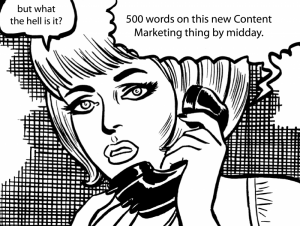 Content marketing continues to be red hot, and the reason is simple – it works.
Content marketing continues to be red hot, and the reason is simple – it works.
However, there is an issue with it. The issue is that many people have different interpretations of the term content marketing. This makes the term too broad, leading to conversations where we use the same words, but they mean different things. This creates confusion.
We need to apply some rigor to defining content marketing. Otherwise, everything can be considered content marketing – everyone who ever put together an ad campaign will surely tell you that it is made up of “content.” And if everything is content marketing, then nothing is.
Earlier this year I inflamed plenty of folks with my post These Things Are Not Content Marketing. The premise was that not all content is content marketing.
So, how do we define content marketing? Better yet, how does the industry define it? Here are seven definitions, starting with the folks that should know best, the Content Marketing Institute.
They define content marketing as “a strategic marketing approach focused on creating and distributing valuable, relevant, and consistent content to attract and retain a clearly defined audience—and, ultimately, to drive profitable customer action.”
I believe this is too vague. I think CMI wants to include everyone, but I feel we’ve moved beyond that. Content marketing has too many people jumping on the bandwagon, and this lets them all in. Don Draper could have seen this definition in 1963 and said, “yep, that’s my job.” To me, that just makes it regular marketing. I want a clearer definition of content marketing.
“Content marketing is any marketing format that involves the creation and sharing of media and publishing content in order to acquire customers.”
Ditto here. Too broad.
“Storytelling for Sales.”
That’s good. Really concise, which is always good. Unless it’s too concise, and therefore open to a little too much interpretation? I’m probably quibbling.
“Content Marketing means creating and sharing valuable free content to attract and convert prospects into customers, and customers into repeat buyers. The type of content you share is closely related to what you sell; in other words, you’re educating people so that they know, like, and trust you enough to do business with you.”
I like this a lot. Copyblogger is always so plainspoken with everything they write. They use simple language to convey big ideas. This definition implies that content curation is part of content marketing, and that’s a good twist.
“Custom publishing marries the marketing ambitions of a company with the information needs of its target audience. This occurs through the delivery of editorial content – via print, Internet, and other media – so intrinsically valuable that it moves the recipient’s behavior in a desired direction.”
This is a good definition. “Editorial content” implies non-promotional, although perhaps not overtly enough for my tastes. “Intrinsically valuable” is a crucial element to great content marketing.
Rebecca Lieb, Altimeter Group analyst
“Content marketing differs from advertising in two fundamental ways. First, content resides on owned or earned media. If there’s a media buy involved, it’s advertising, not content marketing. Second, content marketing is a pull, rather than a push, strategy. Content doesn’t interrupt, it attracts.”
Rebecca has literally written a book called “Content Marketing” so she certainly knows what she’s talking about. This definition is a couple years old; I wonder if she’d still draw such a stark line between content marketing and paid advertising, given the rise of native advertising. More recently, she wrote about content marketing’s role in native advertising.
“The creation and distribution of journalistic, audience-focused content that helps people do their jobs or live their lives.”
That’s what we think. The word journalistic raises the bar on quality by implying a more rigorous approach to content creation, based upon research and interviews. Audience-focused takes out the self-promotional content that some other definitions include – again, to us, that’s just marketing as it’s always been.
Agree? Disagree? Tweet at us @ScribewisePro with your thoughts.
Image courtesy of idezign.me.